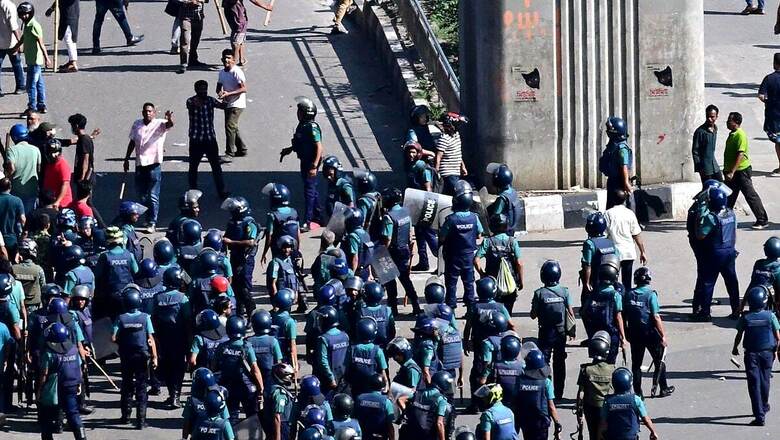
views
In a shocking, but not entirely unexpected development, Bangladesh’s Sheikh Hasina-led democratically elected government was ousted from power by the military on August 5, 2024. In a dramatically staged military coup, the Bangladeshi Army marched to the prime minister’s residence, following which Sheikh Hasina had to flee Dhaka in an Indian Army helicopter.
Crowds of protestors were seen going berserk, rampaging the PM’s house, reminding of the scenes witnessed in Sri Lanka after it went bankrupt in 2022 and Afghanistan after the Taliban comeback. The coup that lasted over 45 minutes has ended the 15-year rule of Awami League and is likely to catapult the destiny of the South Asian nation, much touted as a rare example of an Islamic nation with a functional democracy and flourishing economy, into the clutches of Islamic extremists. As per the most recent updates, Sheikh Hasina was flown to an IAF base in Uttar Pradesh. She was expected to proceed onwards to claim political asylum in the United Kingdom, but there has been no news since.
The Genesis
The power-packed drama that unfolded in Bangladesh began on July 1, 2024, on the issue of quotas in government jobs. After the creation of Bangladesh in 1971, Sheikh Mujibur Rahman, the first prime minister and the father of the nation, reserved 30 per cent of civil service and public sector jobs for the families of the freedom fighters who fought in the liberation movement against Pakistan. However, in the wake of large-scale student protests, Hasina scrapped all the quotas in 2018. In June 2024, the high court ruled against the government’s decision after the petitions filed by the descendants of war veterans and restored the quota. Finally, on August 1, the Supreme Court nullified the HC decision bringing the quotas down to 5 per cent. However, the anti-quota protests morphed into anti-government protests because of the severe crackdown leading to the death of 300 protestors over the last one month.
On August 4, 100 protestors were killed in just one day. The protestors, particularly the students, launched a civil disobedience campaign, urging people to stop paying taxes and utility bills and to cease work in factories and government offices until Sheikh Hasina resigned. On August 5, they called for a ‘long march,’ which saw thousands of people participating, ultimately storming the prime minister’s residence and forcing her ouster. After her removal, the Chief of the Armed Forces, General Waker-Uz-Zaman, addressed the nation, taking full responsibility for the stability and security of the country and announcing the formation of an interim government.
The Role of Foreign Actors
A superficial glance at the trajectory of events over the last month in Bangladesh suggests a popular uprising against an authoritarian regime that has secured its control through manipulating elections and other unfair practices. The brutal crackdown on unarmed student protests further supports this perception. However, the reality is far more complex than it appears on the surface.
Bangladesh, due to its strategic importance, has been on the radar of several global powers for the last four decades, ever since it emerged as an independent nation from Pakistan. In the August 5 coup, foreign actors played an instrumental role. India’s External Affairs Minister S Jaishankar, in his official statement, hinted at the involvement of foreign players, suggesting that the sole purpose of the protests was to dislodge Sheikh Hasina. A closer examination of the events reveals that it was the judiciary, rather than the Hasina government, that supported the reservations. Today, the judiciary remains intact, but Hasina is out. While there was undoubtedly a degree of high-handedness in the state’s handling of the protests, the way the protests intensified even after the Supreme Court scrapped the quotas, coupled with the crucial role played by Jamaat-e-Islami, provides substantial grounds to investigate the potential influence of invisible foreign players.
The key foreign players in the ongoing unrest in Bangladesh are the US, Pakistan, and China. When discussing the role of the US in the anti-Hasina protests, it is important to note that the US is a major player in Bangladesh. It is the largest foreign investor, the third-largest trading partner, and the biggest market for Bangladesh’s garment industry. Sheikh Hasina’s independent foreign policy and growing tilt towards China had become a significant concern for the US.
The US expressed ‘disappointment’ and ‘concern’ following Sheikh Hasina’s victories in the 2014 and 2018 polls. In 2021, the US sanctioned Dhaka’s elite paramilitary force, the Rapid Action Battalion (RAB). In December 2022, the US envoy to Dhaka, Peter Haas, met the families of victims of forced disappearances, primarily BNP leaders. The Hasina government strongly objected, accusing the US of supporting the BNP and interfering in internal matters. Subsequently, Bangladesh was not invited to democracy summits in March 2023. In April, Hasina categorically stated that the US wanted regime change in Dhaka, aiming to displace a democratically elected government. During Sheikh Hasina’s April 2023 trip to Washington DC for the World Bank meeting, no one from the Biden administration met her.
After Sheikh Hasina’s thumping victory in the recent elections, the US had raised serious concerns about the transparency and fairness of the electoral process. Such statements and attempts to defend democracy are often laden with ulterior motives, with the deep state in real control of affairs. The elections in Bangladesh were conducted amid strong criticism from the US, EU, and other Western entities, which called for a transparent electoral process. The US insisted that the elections be held under the supervision of a caretaker government; however, Sheikh Hasina rejected this proposal.
US Ambassador Peter Haas met with the Chief Election Commissioner, demanding free, fair, and inclusive elections that included the Opposition, primarily the BNP and Jamaat-e-Islami. He also met with several civil society members and organisations, propagating the narrative of ‘democratic backsliding’ in Bangladesh. The rupture in US-Bangladesh relations was evident in the US State Department’s July 22 statement, which called on the Awami League government to uphold the right to peaceful protests. State Department spokesperson Matthew Miller said, “We condemn any violence against peaceful protesters.”
Islami Chhatra Shibir, the student wing of Jamaat-e-Islami, an Islamic extremist/terrorist group known for its links with Pakistan’s Deobandi terror groups like Harkat-ul-Jihad-al-Islami, reportedly charmed many Western NGOs and civil society groups with its rhetoric of democracy, justice, and civil rights. The group was found coordinating with these entities in organising street-level protests. Tensions between the US government and the Hasina administration intensified when the latter accused Nobel Laureate Mohammad Yunus of corruption and of sabotaging the World Bank loan for a dam project on the Padma River, allegedly using his connections in US power circles. Interestingly, Mohammad Yunus, who has strong support among Western elites, particularly the Soros lobby, has been appointed as a chief advisor to the interim government in Bangladesh.
The tensions between the US and the Hasina family traced back to the 1971 War of Liberation and the assassination of Sheikh Mujibur Rahman. It is important to view the US’s attitude towards Bangladesh in the context of the 1971 war. Pakistan, a member of the Central Treaty Organisation (CENTO), was a key pillar of the US’ West Asia strategy in the 1960s and 70s. The US perceived the Bangladeshi freedom movement and the defeat of Pakistan as a serious affront to its authority. Henry Kissinger and Richard Nixon, in their blind support of Pakistan, ignored the Pakistani Army’s brutal genocide of 3 million civilians in Bangladesh, mostly Hindus. Despite its efforts, the US could not prevent the breakup of Pakistan.
Since then, the strategic ties between the US and Pakistan have strengthened. Pakistan has consistently supported radical Islamist and terrorist elements, such as Jamaat-e-Islami in Bangladesh and its affiliates like Khaleda Zia’s Bangladesh National Party (BNP). In 2019, the ISI made significant efforts to bring the BNP/Jamaat back to power by selecting and funding the right candidates through Dubai-based hawala networks. Most recently, in the 2024 elections, the Pakistan High Commission’s interference was evident when BNP leaders were found meeting with Pakistani diplomats before the polls.
Jamaat-e-Islami supported the Pakistani Army in the 1971 war and was complicit in the mass slaughter of Bangladeshis. Many of its senior members have been executed for heinous war crimes. However, some of them are still living comfortably in the US and engaging in extremist activities with organisations like CAIR and ICNA. In the recent coup, it was reported that Khaleda Zia’s son Tariq met the ISI chief in London and Saudi Arabia. Jamaat-e-Islami has played a crucial role in mobilising people and organising anti-government protests, with its Islamist thugs dominating the streets. Interestingly, the chief of Jamaat-e-Islami, Shafiqur Rahman, was present with the army chief during the address. After the military coup, Jamaat cadres and protestors attacked Hindus, raped their women, burned their homes and temples, and killed many of them.
Lately, the US has been concerned about the expanding presence of China in Bangladesh. During Hasina’s tenure, China emerged as a robust development, economic, and connectivity partner with Dhaka. Sheikh Hasina had declined to join the QUAD, tactfully balancing her interests and ties with both India and China. Hence, the US’ interest in deepening its strategic footprint in Bangladesh makes sense against the backdrop of China’s expanding presence. Additionally, exerting influence over Bangladesh through a favourable regime would provide the US with leverage to tighten the noose around India, which, under the Modi government, has maintained its independent foreign policy and refused to buckle under US pressure regarding the Ukraine war.
Over the last few years, India-US ties have gone through a rough patch. Despite extensive US penetration in the security establishment, foreign service, Delhi’s think tanks, intellectual circles, and no-bounds love for the US among the Indian babus who love to send their children to the US, the relationship remains fractious. The US continues to shelter anti-India Khalistani and Islamist extremists. The recent killings of Khalistani extremists in the US and Canada, allegedly with Indian involvement, have further strained bilateral ties.
Modi-led India has often been a prime target of the US democratic backsliding narrative. Hence, ousting the pro-India Hasina government and installing an anti-India regime led by BNP and Jamaat elements, under the patronage of the ISI, aligns with US calculations to exert further pressure on India.
In addition to these rational explanations, Hasina’s accusations against the US further strengthen the case for a thorough investigation into the CIA’s role in her ouster. In May 2024, Hasina alleged that the US was nurturing plans to build a naval base on St Martin’s Island off the coast of Chittagong. She had also alleged a “white man’s” plot to carve out a “Christian state” that would include parts of Bangladesh and Myanmar, alluding to the ongoing violence in Myanmar’s Rakhine province and its effects in Chittagong.
Eminent security expert Namit Verma has cited crucial geoeconomic reasons for the US interest in Bangladesh. In an interview with Usanas Foundation, an India-based foreign policy think tank, he suggested that the US is disturbed by the Modi government’s decision to proceed with deep-sea drilling in the Bay of Bengal region—a significant reservoir of hydrocarbons that remains largely unexplored. Verma noted that if India, a major consumer of oil and gas, explores these reserves, its dependence on oil and gas imports will significantly decrease. Such a scenario would not be conducive to US economic interests. Additionally, Saudi Arabia’s decision to end the petrodollar agreement of 1974 exacerbates Washington’s economic concerns. Hence, a favourable regime in Bangladesh may come in handy in controlling the hydrocarbon drilling in the Bay of Bengal region.
In India’s current media, think tank, and public discourse on the August 5 coup, many experts are pointing fingers at China, while dismissing the possibility of Washington’s involvement. It should be noted that some of these arguments come in the context of ongoing tensions between India and China. Many such experts argue that since India is not yielding to China on border issues and is steadfastly maintaining its stance on Galwan, China might seek to pressure India by installing an anti-India regime in Bangladesh. To a certain extent, this reasoning appears convincing. However, closer scrutiny raises the question of whether China would dislodge an anti-American government in Bangladesh solely to pressure India, especially when the new pro-Pakistan and pro-American Islamist regime might offer an airbase to the US, right in China’s backyard.
Such a scenario would only be plausible if China and the US were collaborating at a deeper level while maintaining the global perception of strategic competition and rivalry. However, this would require stronger evidence. Although there are unconfirmed reports of Jamaat-e-Islami receiving funds from Pakistan-based Chinese entities, China may not be pleased with Sheikh Hasina’s ouster, as her government had established a robust economic and development partnership with China. Additionally, there is a strong possibility that the American lobby within the Indian security, foreign policy, and think tank community is leading the narrative that China is the major player in the Bangladeshi coup.
The author is a Cornell University graduate in public affairs, bachelors from St Stephen’s College, Delhi and has done his PhD on Jaish-e-Mohammad. He is a policy analyst specialising in counterterrorism, Indian foreign policy and Afghanistan-Pakistan geopolitics. The views expressed in this article are those of the author and do not represent the stand of this publication.

















Comments
0 comment